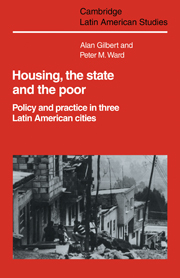Book contents
- Frontmatter
- Contents
- List of figures
- List of tables
- Acknowledgements
- Abbreviations
- 1 Introduction: the research issues and strategy
- 2 Bogotá, Mexico City and Valencia: the social, economic and political backcloth
- 3 Access to land
- 4 Servicing low-income settlements
- 5 Community organization: participation or social control?
- 6 Conclusions
- Appendix 1 The methodology in detail
- Appendix 2 Description of the survey settlements
- Notes
- Bibliography
- Author index
- Subject index
- CAMBRIDGE LATIN AMERICAN STUDIES
1 - Introduction: the research issues and strategy
Published online by Cambridge University Press: 04 August 2010
- Frontmatter
- Contents
- List of figures
- List of tables
- Acknowledgements
- Abbreviations
- 1 Introduction: the research issues and strategy
- 2 Bogotá, Mexico City and Valencia: the social, economic and political backcloth
- 3 Access to land
- 4 Servicing low-income settlements
- 5 Community organization: participation or social control?
- 6 Conclusions
- Appendix 1 The methodology in detail
- Appendix 2 Description of the survey settlements
- Notes
- Bibliography
- Author index
- Subject index
- CAMBRIDGE LATIN AMERICAN STUDIES
Summary
State intervention and the urban poor: major issues concerning housing, planning and servicing in Latin American cities
The main objective of this study is to improve understanding of the social conditions and the role of the poor within urban society in Latin America. More specifically, the aim is to understand how the needs of the urban poor with respect to housing and servicing are articulated and satisfied. The study examines the aims, development and implementation of government policies towards low-income housing dwellers, tries to relate those policies to the wider interests of the state and the constraints within which it acts, and examines governmental success in meeting the needs of the poor. We examine the needs of the poor, their understanding of the main constraints on barrio servicing and improvement, their involvement in community organizations and the role that the community and its leaders play in influencing state action. Since housing and servicing directly impinge on the interests of politicians, bureaucrats, landowners, and real-estate developers, as well as those of the poor, they represent critical elements in the relationship between the poor and the wider urban society. Essentially, therefore, the research is interested in how resources are allocated within urban society and how political and administrative power operates at the municipal level.
The research was conducted in three Latin American cities, Bogotá, Mexico City and Valencia, as a reaction to the dominant trend in urban studies to concentrate on a single centre.
- Type
- Chapter
- Information
- Housing, the State and the PoorPolicy and Practice in Three Latin American Cities, pp. 1 - 27Publisher: Cambridge University PressPrint publication year: 1985

